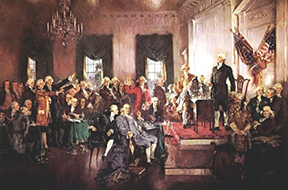Some people argue the Constitution was adopted illegally. They assert that the Confederation Congress needed to approve the document, but never did. But principles of law tell us that they are wrong. So does a rarely-mentioned letter from a member of the Confederation Congress.
It is true that most (not all) of the resolutions by which state legislatures authorized participation in the Constitutional Convention said Congress should approve the convention’s proposal. It is also true that Congress’s unanimous resolution sending the document to the states for ratification did not say specifically, “We approve.”
But those facts don’t prove the Constitution was adopted illegally.
The congressional journal tells us why Congress did not formally approve: Some members believed the Articles of Confederation granted Congress no power to approve a proposal of this nature. So the states had expected an event legally impossible to fulfill.
Here’s what the law provides in that kind of situation:
When parties agree to several terms and, contrary to their expectations, one of those terms proves impossible, then the agreement may or may not be valid. It depends on how crucial (“material”) the impossible term was.
Example #1: You agree to sell me wheat for a certain price, and I agree to take delivery at 4 p.m. on a particular day. It proves impossible for me to pay. Obviously getting paid is central to the deal, so you may back out of the bargain and refuse to deliver the wheat.
Example #2: You agree to sell me wheat for a certain price, and I agree to take delivery at 4 p.m. on a particular day. Traffic makes it impossible for me to arrive until 5 p.m. Unless there are unusual facts to the contrary, the hour’s difference is not material, so you can’t refuse to deliver. At most, you may be entitled to compensation for any injury you suffered because of the delay.
How material was a formal congressional resolution of approval to the states’ agreement to participate in the convention? Not very. The Articles of Confederation was a treaty organization among sovereigns, and sovereigns always have the right to negotiate with each other outside the treaty structure. What was important in those circumstances wasn’t whether Congress approved the deal. What was important was whether the states approved the deal. Several states didn’t think congressional approval was even important enough to mention in their resolutions, and no state refused to ratify because Congress hadn’t approved first. In fact, a competent lawyer would say that even if congressional approval had been material, the states “waived” it, as they had every right to do.
But wait: Didn’t Congress really approve after all? True, the congressional resolution didn’t say “We approve.” But Congress raised no objection and it affirmatively sent the Constitution to the states for ratification. Congress didn’t say, “Hey, we were supposed to approve any deal here, and we object!” Isn’t this a classic case of silence signifying consent?
Abraham Clark thought so. He was a member of Congress from New Jersey. In a letter-to-the-editor of the New Jersey Journal dated February 4, 1789 he explained his vote for the resolution transmitting the Constitution to the states:
Notwithstanding my dislike to some parts [of the Constitution], considering the situation the United States was in, and the provision made in the Constitution for amendments, I cheerfully gave my assistance to send it to the states for their consideration, judging that New-Jersey, from its local situation and circumstances, could not with propriety reject it, notwithstanding its imperfections: presuming at the same time, that the new Congress would endeavor to amend it as soon as other important business for putting the government into operation would admit.
“Could not with propriety reject it” means, of course, “it would be improper to reject it” or “to act properly, accept it.” This approval may have been a little grudging (although Clark says it was “cheerful”) but it surely was approval.
Of course, Clark’s letter doesn’t tell us what other members of Congress were thinking, but it certainly buttresses the common-sense view that Congress’s resolution was de facto consent. Indeed, the congressional journals record no one objecting to the Constitution that day.








